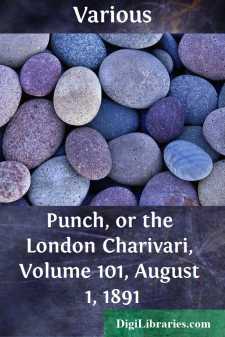Categories
- Antiques & Collectibles 13
- Architecture 36
- Art 48
- Bibles 22
- Biography & Autobiography 813
- Body, Mind & Spirit 142
- Business & Economics 28
- Children's Books 17
- Children's Fiction 14
- Computers 4
- Cooking 94
- Crafts & Hobbies 4
- Drama 346
- Education 46
- Family & Relationships 57
- Fiction 11829
- Games 19
- Gardening 17
- Health & Fitness 34
- History 1377
- House & Home 1
- Humor 147
- Juvenile Fiction 1873
- Juvenile Nonfiction 202
- Language Arts & Disciplines 88
- Law 16
- Literary Collections 686
- Literary Criticism 179
- Mathematics 13
- Medical 41
- Music 40
- Nature 179
- Non-Classifiable 1768
- Performing Arts 7
- Periodicals 1453
- Philosophy 64
- Photography 2
- Poetry 896
- Political Science 203
- Psychology 42
- Reference 154
- Religion 513
- Science 126
- Self-Help 84
- Social Science 81
- Sports & Recreation 34
- Study Aids 3
- Technology & Engineering 59
- Transportation 23
- Travel 463
- True Crime 29
Punch, or the London Charivari, Volume 101, August 1, 1891
by: Various
Categories:
Description:
Excerpt
THE PRINCE.
(A Letter from Nicola Puncio Machiavelli to the Most Illustrious Vittorio Emanuele, Son of Umberto, King of Italy.)
I.
There never was, nor is at this day, any man in the world who is not either a Prince or not a Prince. Seeing, therefore, that your Highness appertains of right to the class of them that are Princes, and being ambitious to present to your Highness that which should have the chiefest value in your eyes, I could not (though pondering much) deem anything more precious than the knowledge of men and of governments which I have learned through a space of half a hundred years. Forasmuch as your Highness hath travelled over stormy seas to the island of the British folk, I do presume to present to your Highness, as being one that seeketh wisdom, the ripe fruit of my knowledge, in order that your Highness may suck thereout such advantage as those who love your land chiefly desire both for yourself and for them to whose government you shall in the future be called.
II.—How a Prince is to gain Reputation.
To begin, then, I say it would be advantageous to be accounted both liberal and of a like nature unto other men that are not Princes. For although the majority of mankind be penurious and apt to hoard their money, and although in their assembly the British make a show of niggardliness, imputing it to themselves for a virtue, nevertheless, if they discern in a Prince such inclinations as they praise in themselves, no nation was ever quicker to blame or decry. For each holds in private that while he himself is generous, the rest are mean and covetous. Therefore, I counsel you let your conduct in the bestowal both of snuff-boxes, which no man at this day uses, and of scarf-pins, which are a delight to many, be so ordered that men may think of you as one that with a true generosity performs such acts as each of them, were he a Prince, would perform as well.
Likewise if there be those who wish to read unto you addresses of loyal welcome, it is not well to flout them publicly by showing signs of sleep; since it is the fashion of municipalities and Mayors to hold themselves to be of high importance, and a wise flattery of this self-deception well becomes you. And in replying, let your speech be both short and homely. The present German Emperor came lately among this people, and, having spoken aloud of the kindness of his Grandmamma, at once the hearts of all of them that are or hope to be grandmammas, or have themselves possessed a grandmamma, were moved to him so that he was accounted one of themselves from that time forth.
Again, how honourable it is for a Prince to be outspoken, candid, and truthful, I suppose everybody understands. Nevertheless, experience has shown in our times that those Princes who have not pinned themselves up to that excess of truth-speaking, have not alone secured the love of their subjects, but have been held up as patterns of a royal wisdom and virtue. For in the assemblages of the great that shall be gathered in your honour, and in the banquets and receptions wherewith it is customary to overwhelm a Prince, there must often be those surrounding him, and holding converse with him, whose absence would cause him joy rather than sorrow, on account of their exceeding pompous dulness....












